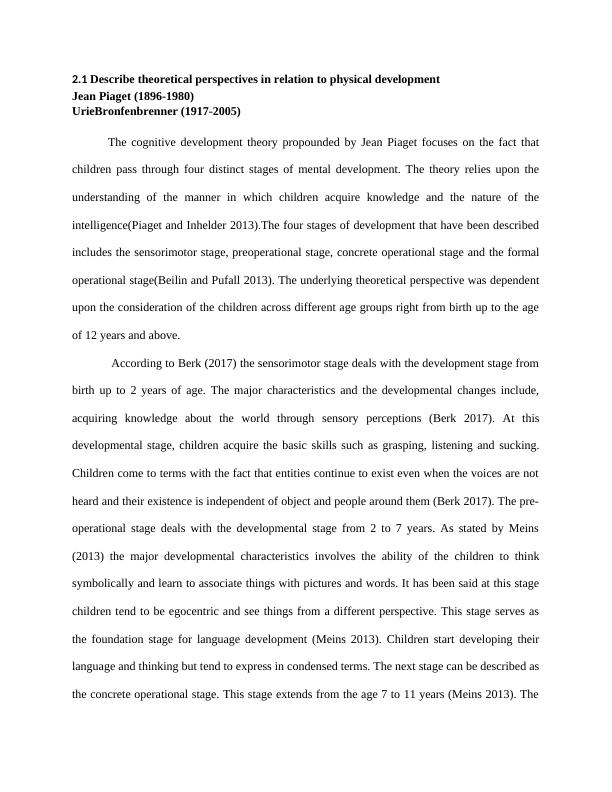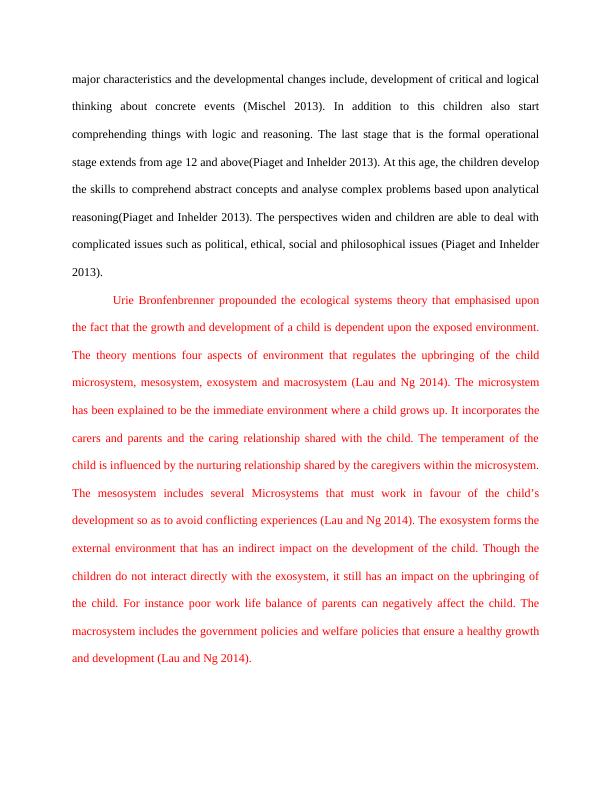Theoretical Perspectives on Physical Development in Children
Added on 2023-05-29
4 Pages1055 Words380 Views
2.1 Describe theoretical perspectives in relation to physical development
Jean Piaget (1896-1980)
UrieBronfenbrenner (1917-2005)
The cognitive development theory propounded by Jean Piaget focuses on the fact that
children pass through four distinct stages of mental development. The theory relies upon the
understanding of the manner in which children acquire knowledge and the nature of the
intelligence(Piaget and Inhelder 2013).The four stages of development that have been described
includes the sensorimotor stage, preoperational stage, concrete operational stage and the formal
operational stage(Beilin and Pufall 2013). The underlying theoretical perspective was dependent
upon the consideration of the children across different age groups right from birth up to the age
of 12 years and above.
According to Berk (2017) the sensorimotor stage deals with the development stage from
birth up to 2 years of age. The major characteristics and the developmental changes include,
acquiring knowledge about the world through sensory perceptions (Berk 2017). At this
developmental stage, children acquire the basic skills such as grasping, listening and sucking.
Children come to terms with the fact that entities continue to exist even when the voices are not
heard and their existence is independent of object and people around them (Berk 2017). The pre-
operational stage deals with the developmental stage from 2 to 7 years. As stated by Meins
(2013) the major developmental characteristics involves the ability of the children to think
symbolically and learn to associate things with pictures and words. It has been said at this stage
children tend to be egocentric and see things from a different perspective. This stage serves as
the foundation stage for language development (Meins 2013). Children start developing their
language and thinking but tend to express in condensed terms. The next stage can be described as
the concrete operational stage. This stage extends from the age 7 to 11 years (Meins 2013). The
Jean Piaget (1896-1980)
UrieBronfenbrenner (1917-2005)
The cognitive development theory propounded by Jean Piaget focuses on the fact that
children pass through four distinct stages of mental development. The theory relies upon the
understanding of the manner in which children acquire knowledge and the nature of the
intelligence(Piaget and Inhelder 2013).The four stages of development that have been described
includes the sensorimotor stage, preoperational stage, concrete operational stage and the formal
operational stage(Beilin and Pufall 2013). The underlying theoretical perspective was dependent
upon the consideration of the children across different age groups right from birth up to the age
of 12 years and above.
According to Berk (2017) the sensorimotor stage deals with the development stage from
birth up to 2 years of age. The major characteristics and the developmental changes include,
acquiring knowledge about the world through sensory perceptions (Berk 2017). At this
developmental stage, children acquire the basic skills such as grasping, listening and sucking.
Children come to terms with the fact that entities continue to exist even when the voices are not
heard and their existence is independent of object and people around them (Berk 2017). The pre-
operational stage deals with the developmental stage from 2 to 7 years. As stated by Meins
(2013) the major developmental characteristics involves the ability of the children to think
symbolically and learn to associate things with pictures and words. It has been said at this stage
children tend to be egocentric and see things from a different perspective. This stage serves as
the foundation stage for language development (Meins 2013). Children start developing their
language and thinking but tend to express in condensed terms. The next stage can be described as
the concrete operational stage. This stage extends from the age 7 to 11 years (Meins 2013). The

major characteristics and the developmental changes include, development of critical and logical
thinking about concrete events (Mischel 2013). In addition to this children also start
comprehending things with logic and reasoning. The last stage that is the formal operational
stage extends from age 12 and above(Piaget and Inhelder 2013). At this age, the children develop
the skills to comprehend abstract concepts and analyse complex problems based upon analytical
reasoning(Piaget and Inhelder 2013). The perspectives widen and children are able to deal with
complicated issues such as political, ethical, social and philosophical issues (Piaget and Inhelder
2013).
Urie Bronfenbrenner propounded the ecological systems theory that emphasised upon
the fact that the growth and development of a child is dependent upon the exposed environment.
The theory mentions four aspects of environment that regulates the upbringing of the child
microsystem, mesosystem, exosystem and macrosystem (Lau and Ng 2014). The microsystem
has been explained to be the immediate environment where a child grows up. It incorporates the
carers and parents and the caring relationship shared with the child. The temperament of the
child is influenced by the nurturing relationship shared by the caregivers within the microsystem.
The mesosystem includes several Microsystems that must work in favour of the child’s
development so as to avoid conflicting experiences (Lau and Ng 2014). The exosystem forms the
external environment that has an indirect impact on the development of the child. Though the
children do not interact directly with the exosystem, it still has an impact on the upbringing of
the child. For instance poor work life balance of parents can negatively affect the child. The
macrosystem includes the government policies and welfare policies that ensure a healthy growth
and development (Lau and Ng 2014).
thinking about concrete events (Mischel 2013). In addition to this children also start
comprehending things with logic and reasoning. The last stage that is the formal operational
stage extends from age 12 and above(Piaget and Inhelder 2013). At this age, the children develop
the skills to comprehend abstract concepts and analyse complex problems based upon analytical
reasoning(Piaget and Inhelder 2013). The perspectives widen and children are able to deal with
complicated issues such as political, ethical, social and philosophical issues (Piaget and Inhelder
2013).
Urie Bronfenbrenner propounded the ecological systems theory that emphasised upon
the fact that the growth and development of a child is dependent upon the exposed environment.
The theory mentions four aspects of environment that regulates the upbringing of the child
microsystem, mesosystem, exosystem and macrosystem (Lau and Ng 2014). The microsystem
has been explained to be the immediate environment where a child grows up. It incorporates the
carers and parents and the caring relationship shared with the child. The temperament of the
child is influenced by the nurturing relationship shared by the caregivers within the microsystem.
The mesosystem includes several Microsystems that must work in favour of the child’s
development so as to avoid conflicting experiences (Lau and Ng 2014). The exosystem forms the
external environment that has an indirect impact on the development of the child. Though the
children do not interact directly with the exosystem, it still has an impact on the upbringing of
the child. For instance poor work life balance of parents can negatively affect the child. The
macrosystem includes the government policies and welfare policies that ensure a healthy growth
and development (Lau and Ng 2014).

End of preview
Want to access all the pages? Upload your documents or become a member.
Related Documents
Cognitive Development: Piaget's Theory and Stageslg...
|5
|1052
|43
Developmental Theories of Different Ageslg...
|5
|693
|193
Cognitive Development Theory of Jean Piaget and its Application to Health and Wellbeinglg...
|7
|2069
|90
Piaget’s theory of Cognitive Development: Extent to which it supports skills based learning in primary schoolslg...
|15
|613
|141
Theories of Piaget and Vygotsky on Child Developmentlg...
|8
|1772
|144
Early Childhood Development by Piagetlg...
|6
|1430
|16
